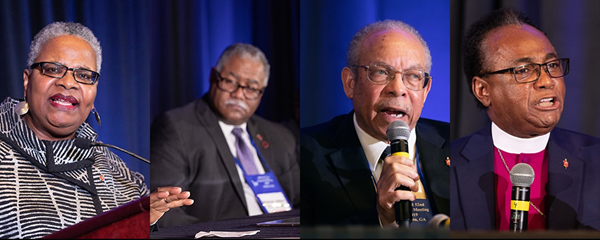African American bishops and other members of The United Methodist Church’s black caucus recently joined in the many conversations happening in the wake of the denomination’s recent General Conference.
At the 52nd General Meeting of Black Methodists for Church Renewal, this Spring, a panel of seven active and retired black episcopal leaders — known to the caucus as Ebony Bishops — offered their views and responded to questions about the decisions made by the church’s top lawmaking assembly in St. Louis.
Part of the discussion at BMCR wrestled with how black churches should perceive and respond to the decisions from a racial perspective and what objectives they should consider if the General Conference vote results in schism in the denomination — especially if churches are permitted to leave conditionally with their properties and assets. The Council of Bishops also asked the Judicial Council to make a declaratory decision on the constitutionality of a petition that outlines procedures for local churches to disaffiliate from the denomination and retain property.
“A hermeneutics of division sets up a praxis of exclusion, and we know what that leads to,” said Bishop LaTrelle Easterling, who leads the Baltimore-Washington Area, in her opening remarks as panel moderator. “To be amongst people who read and interpret Scripture in a way that divides and sets up second-class citizenship — that’s what happened to our mothers and fathers when they created the (former, racially segregated) Central Jurisdiction.
“We may claim that we have always been here and we’re not going anywhere,” she continued. “But that doesn’t mean there aren’t folks trying to move on without us. Everybody who says the name 'Jesus' doesn’t necessarily espouse all that Jesus stands for.”
The Rev. Antoine "Tony" Love, BMCR’s vice chair, said the caucus needs to “place itself squarely in the middle of the larger questions being asked in order to help our church honestly deal with the root causes of its disruption and uncertainty.
“Black United Methodists bring a gift to our church of being able to remain connected in the midst of brokenness,” he said.
“There are some people who would benefit from destabilization of The United Methodist Church,” Bishop Julius Trimble, leader of the Indiana Episcopal Area said. “We (black churches) are being left on the sidelines as observers, while the church is being hurt. So, we need to bring healing for such a time as this.”
Retired Bishop Jonathan Keaton lamented the blaming of African delegates for the Traditional Plan’s victory. “There’s no one group that has a monopoly on pain; a whole bunch of people are in pain,” he said. “But the problem of race remains unsolved in the church. Race is still a key element in the room. Yet, I still believe in an inclusive church.”
Retired Bishop James King expressed “deep concern for all of God’s people.”
excerpt of a story by John Coleman, director of communications, Eastern Pennsylvania Conference, Valley Forge, PA.
One of seven apportioned giving opportunities of The United Methodist Church, the Episcopal Fund pays for bishops’ salaries, office and travel expenses, and pension and health-benefit coverage. Please encourage your leaders and congregations to support the Episcopal Fund apportionment at 100 percent.





